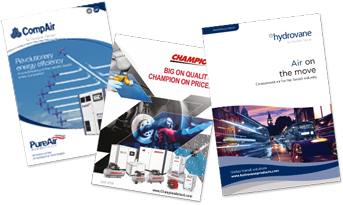Brochures and Downloads
 Go
Go
The Alcoa aluminium refinery in San Ciprián, on the coast of Lugo, Spain installed 33 37kW Hydrovane compressors. The production levels rose, and the costs dropped. The San Ciprián refinery produces primary aluminium from the bauxite.
Bauxite is sedimentary rock which contains alumina, which is a combination of aluminium and oxygen. The rock also contains silica, iron oxides and titanium dioxide. The refining process crushes and heats the bauxite, extracting the alumina and silica, and then uses an electrolytic process to turn the alumina into liquid aluminium.
There are overhead gantry cranes above the electrolytic cells and this is where the Hydrovane compressors are installed.
The refinery requires compressed air to trigger the pneumatic cylinders that the various machine tools use for tasks such as fluidisation and casting. Fluidisation is the process where the rock, crushed into a granular state, is then transformed into a liquid type of formation.
The liquid metal known as casting is removed from tanks with a venturi vacuum effect. The casting process needs a great deal of compressed air and the venturi effect needs the pressure to remain above 6 kg/cm2. The compressors run almost continuously.
Benefit of Hydrovane
The two main benefits are increased productivity and lower maintenance costs. According to Miguel Angel Roman Calderero, Alcoa’s Head of Plant Maintenance, since the Hydrovane installation, the number of failures or other incidents during the metal casting process have decreased.
The refinery had been using Hydrovane compressors for more than 30 years and were due for repair or replacement. Providing compressed air is a complex application, so Hydrovane carried out a site visit, reviewing the set-up and assessing the compressed air needs. As a result, Hydrovane provided two trial units, allowing Alcoa the opportunity for a trial test prior to investing in new equipment.
Calderero said that the new units met their needs. As well, the new compressors were a similar size to the old ones and provided easy access to the compressor’s internal workings.
Another factor involved in the decision is that the new Hydrovane compressor motor runs at 1450 rpm. A screw compressor motor runs at 3000 rpm which would mean more wear and thus higher maintenance costs. Alumina suspension demands high temperatures and results in aggressive gases.
The Hydrovane Solution
The compressors were purpose built, and to install them on gantry cranes, a bespoke base was required. The compressors have high-rated starters in IP65 enclosures. This integrates electronic controls, offering both local and remote options as well as an alarm output.
Each Hydrovane compressor has an oversized oil chamber for quick cooling of the oil. The chamber allows oil to be changed at 2,000 hours. Previously, it was changed at 500 hours. This reduces equipment downtime.
Each compressor’s high flow fan has an oversized cooler. There is also remote cyclonic air intake filtration. The motor specifications provide efficient operation in the exacting atmosphere and high temperatures of the refinery.
Any aftermarket needs, including service kits, parts and lubricants, are met by CompAir Iberia. CompAir Iberia’s preventative maintenance also reduces lost time due to equipment failure.
For further information on how Hydrovane products can make a positive impact on your business, contact Warwickshire and the West Midland’s Approved Hydrovane Distributor on 0121 275 2787 or simply click here.
Knowledge Hub